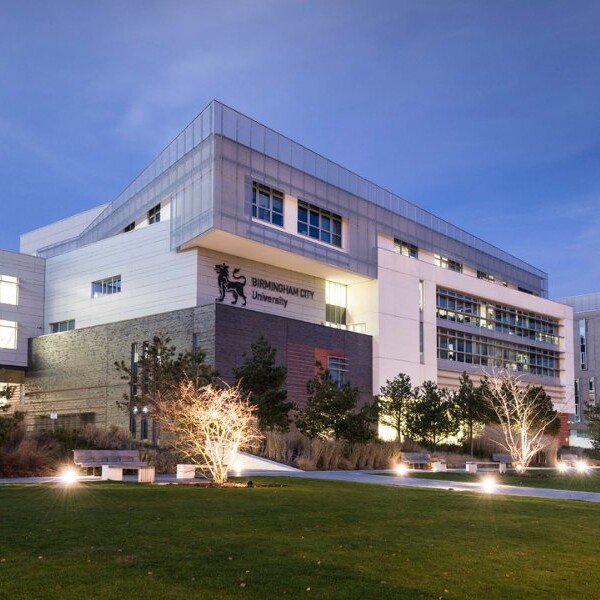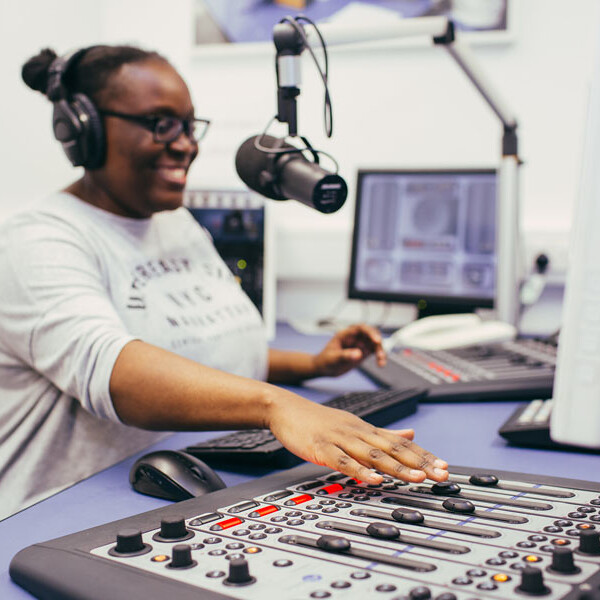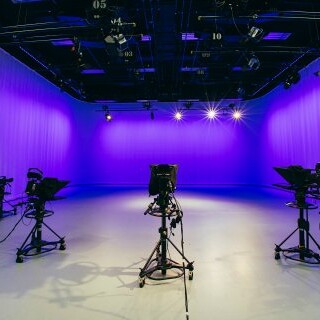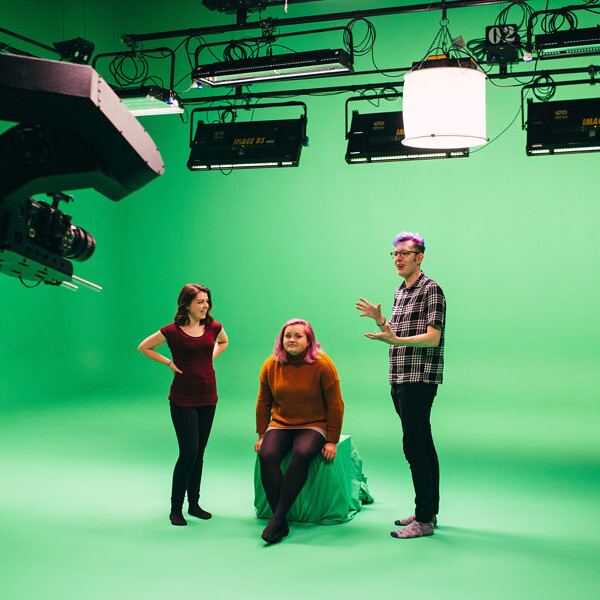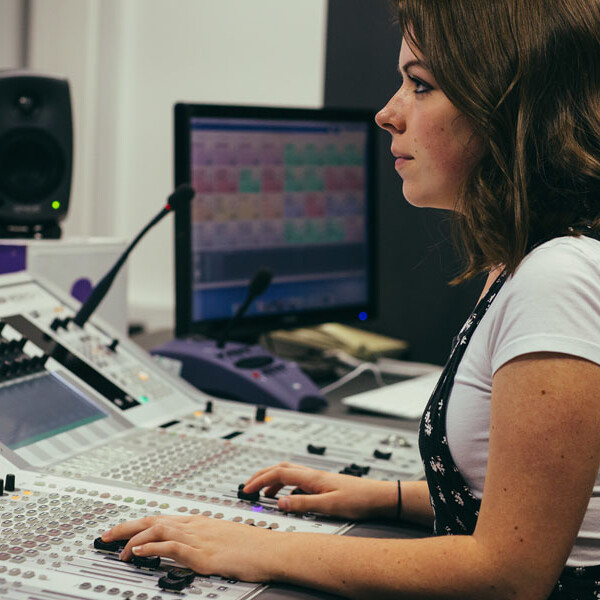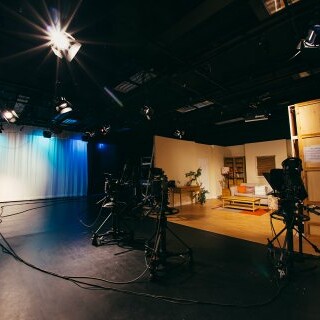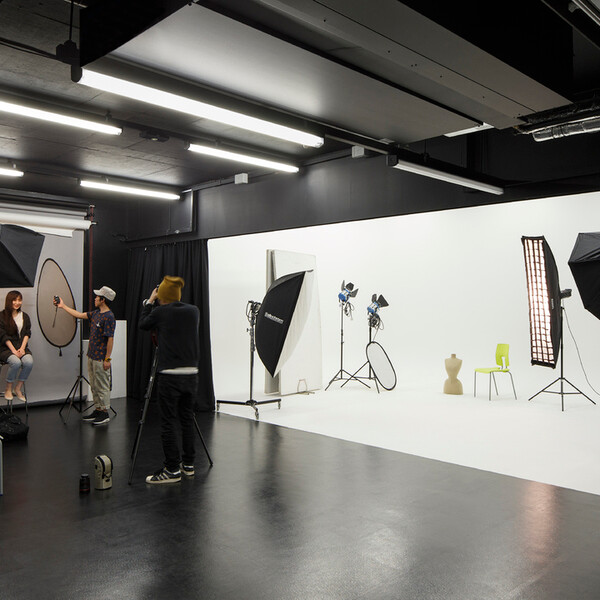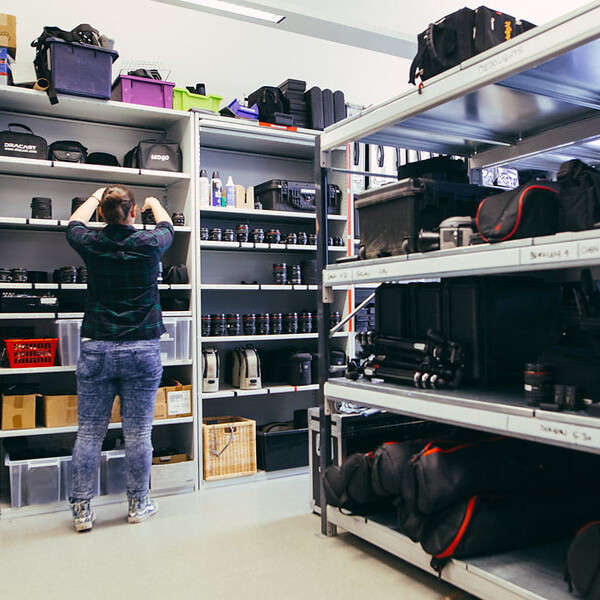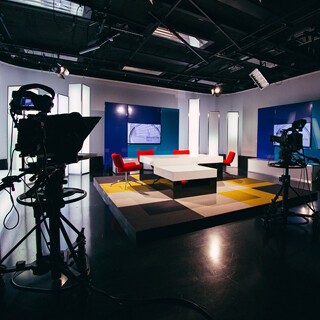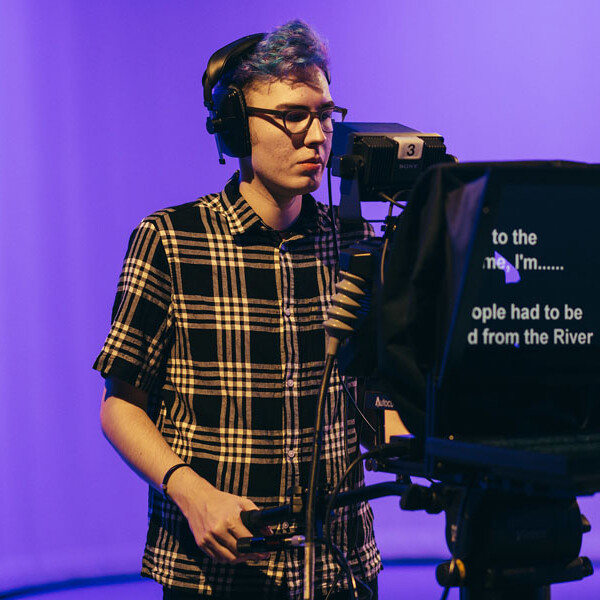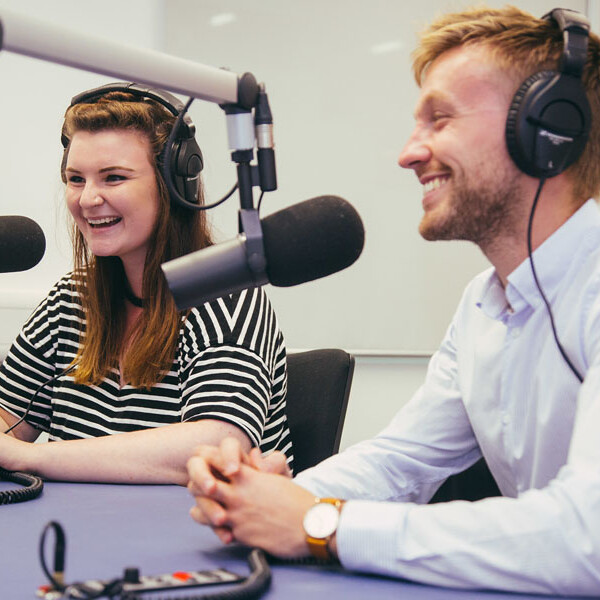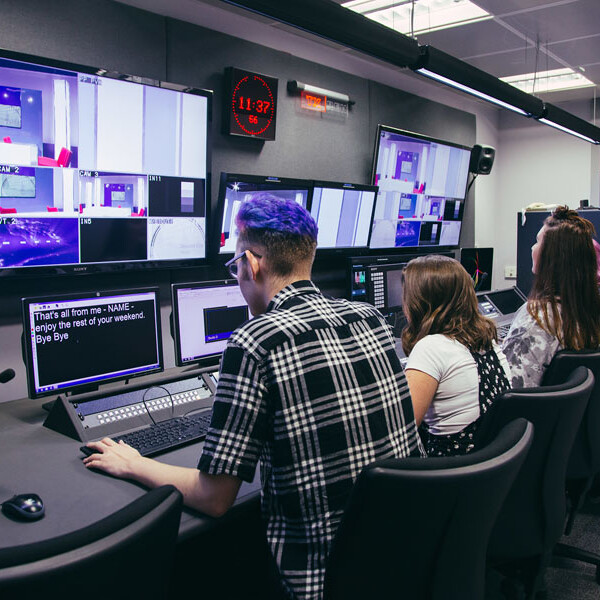
Media Production with a Foundation Year - BA (Hons)
Currently viewing course to start in 2025/26 Entry. Switch to 2026/27 Entry
Launch your media career with our BA (Hons) Media Production degree. Our industry-focussed programme is designed to develop critically thinking, innovative content creators for television, radio, podcasting, online, social media as well as new and emerging platforms ensuring you have the skills and attitude needed to adapt and change in line with industry....
- Level Foundation
- Study mode Full Time
- Award BA (Hons)
- Start date September 2025
- Fees View course fees
- Subject
- Location City Centre
This course is:
Open to International Students
Overview
Launch your media career with our BA (Hons) Media Production degree. Our industry-focussed programme is designed to develop critically thinking, innovative content creators for television, radio, podcasting, online, social media as well as new and emerging platforms ensuring you have the skills and attitude needed to adapt and change in line with industry.
Supported by an experienced team of award-winning tutors with industry and academic experience, students will learn technical and editorial approaches to enable them to tell compelling stories for a range of audiences across multiple platforms. We’ll help you to become ‘industry-ready’ as you learn from guest speakers and industry experts giving you the chance to make useful contacts and get a head start with work placements and other opportunities to gain professional skills.
About foundation courses
This four-year programme has been specifically designed to allow students who do not initially meet the entry requirements for a three-year degree, to undertake additional level 3 study designed to ensure they are successful on their chosen degree programme.
After successful completion of your foundation year, you will have the flexibility to switch (should you wish to change direction) onto a several of related undergraduate media degree programmes.
What's covered in this course?
Through research-led teaching, you will create media content in our industry-standard television and radio studios, learning about all the important roles as you go. Working collaboratively, you will learn how to record audio and shoot and edit video, along with developing the technical and personal skills needed to operate our studios effectively. You will also learn how to develop and pitch your own ideas, a necessary skill in today’s competitive industry, whilst becoming aware of sustainability and ethical issues affecting the media landscape.
There will be opportunities to make traditional content such as magazine shows, documentaries, drama, adverts whilst also exploring new ideas in social media and experimental content. When you work in our enviable complex of six radio studios, you will be getting to grips with how to operate the studio, present a show, record interviews, create podcasts and use digital technology to edit and mix sound. As you progress through the course, you will put together music radio shows, short features and podcasts, with the option to run a live radio station at the University. This is a truly stimulating course, which will immerse you in the editorial and practical aspects of programme-making and content creation.
I’d definitely recommend coming here to Birmingham City University to study. Not only have you got these fantastic facilities, but you’ve also got lecturers and tutors that have been in the industry for many, many years and know exactly what they’re talking about. You also get hands-on time, which you don’t get everywhere, as well as time in the studios, which really got me where I am today.
Ben Stones, Producer, Station Sound, BBC Radio 1, 1Xtra, Radio 2, BBC 6 Music and BBC Asian Network
Why Choose Us?
Work on a live production from the very start! You’ll produce content in radio and television, reaching audiences across Birmingham.
- Learn in our £62 million Parkside building, home to our industry standard television and radio studios.
- Our broadcast-quality digital radio studios are supported by the latest audio production tools and are used by media companies who also work with our students as guest lecturers and on their joint projects.
- You’ll be taught by award-winning academic staff who continue to work in industry, and have an accomplished track record in television and radio production.
- Gain invaluable insight, and contacts from your two (or more) industry placements.
- You’ll have the opportunity to make media abroad on a specialised field trip, or choose to study with an overseas partner.
- You’ll have the opportunity to enhance your industry awareness by getting involved with our Curzon Street Studios team in a wide range of production and film projects, including working on gigs and commercials for professional football clubs and high-profile industry giants such as Sony, Disney and Microsoft.
Similar Courses
Open Days
Join us for an Open Day where you'll be able to learn about this course in detail, chat to students, explore our campus and tour accommodation.
Next Open Day: 28 June 2025
Entry Requirements
These entry requirements apply for entry in 2025/26.
All required qualifications/grades must have been achieved and evidenced at the earliest opportunity after accepting an offer to help confirm admission and allow for on-time enrolment. This can also include other requirements, like a fee status form and relevant documents. Applicants can track their application and outstanding information requests through their BCU mySRS account.
Essential requirements
80 UCAS Tariff points. Learn more about UCAS Tariff points.
If you have a qualification that is not listed, please contact us.
Fees & How to Apply
UK students
Annual and modular tuition fees shown are applicable to the first year of study. The University reserves the right to increase fees for subsequent years of study in line with increases in inflation (capped at 5%) or to reflect changes in Government funding policies or changes agreed by Parliament. View fees for continuing students.
Award: BA (Hons)
Starting: Sep 2025
- Mode
- Duration
- Fees
- Full Time
- 4 years
- £9,535 in 2025/26 ✱ Important note for this price
- Apply via UCAS
(↩Back to price) * The Government is proposing to increase the cap on full-time regulated tuition fees to £9,535 for 2025/26 and the University is planning on increasing fees to that maximum level once legislation is enacted. Part-time fees are charged pro-rata, where applicable.
International students
Annual and modular tuition fees shown are applicable to the first year of study. The University reserves the right to increase fees for subsequent years of study in line with increases in inflation (capped at 5%) or to reflect changes in Government funding policies or changes agreed by Parliament. View fees for continuing students.
Award: BA (Hons)
Starting: Sep 2025
- Mode
- Duration
- Fees
- Full Time
- 4 years
- £17,690 in 2025/26
Guidance for UK students
UK students applying for most undergraduate degree courses in the UK will need to apply through UCAS.
The Universities and Colleges Admissions Service (UCAS) is a UK organisation responsible for managing applications to university and college.
Applying through UCAS
- Register with UCAS
- Login to UCAS and complete your details
- Select your course and write a personal statement
- Get a reference
- Pay your application fee and submit your application
You are not required to submit a portfolio for this course.
Course in Depth
Foundation Year
In order to complete this course a student must successfully complete all the following CORE modules (totalling 120 credits):
This module will introduce you to the underlying principles required to understand media audiences. Audiences are diverse in their make-up and in their motivations for engaging with media. To explore this diversity you will learn a range of techniques for researching audience behaviour, such as survey work, focus groups and online ethnography. Alongside these methods you will explore key concepts to help you to interpret and understand this research data. You will engage with theories of identification and culture in order to understand audience motivations for engaging with media. You will explore the characteristics of audiences and learn how to identify their needs from a production perspective. To complement this investigation, you will also examine other related concepts such as genres and understand how the wider media industry uses the category of audience to create, market and ultimately sell its products. You will learn how to use your research data to present an idea for a media product that will appeal to a particular media audience.
The purpose of this module is to assist you in developing the academic skills needed to succeed in higher education, and the professional skills required to support your ambitions to be a media worker. You will be introduced to the wide range of academic and practical support that the university offers.
Students will plan and produce a media artifact that will evidence their competence in media production to create a meaningful media artifact. The focus in this module is about understanding how image and sound is edited together to create meaningful narratives. In the module students will develop an idea and implement it as a short audio or video piece. Central to creating this piece is learning how to use relevant portable video and sound production equipment and software. The ability to effectively record and edit a variety of media formats using industry standard equipment software is a key skill to develop whilst at university. This module will introduce students to the practical basics of editing.
This module is focused on collaborative work in a media production context. Through a group production activity students will learn about media production hierarchies and how to behave within a team context in order to produce a successful outcome. The module will explore what makes for successful teamwork in the media. The module will further develop the understanding of media production practice.
Identifying and understanding the connections between media theory, culture, and production is an essential skill for students to develop. Understanding how these concepts and practises interlink is key to succeeding at university and working as effective media workers. This module will introduce basic research practise methods and media theory and will enable students to gain insights into the role these concepts play in underpinning media production and culture. The module offers an opportunity for you to explore theoretical concepts in your own practice.
The media project module will present students with the opportunity to consolidate their learning whilst on the Foundation Media course. Students will be invited to devise, plan, and deliver a practical piece of work focused on their area of media interest. Students will draw from their experience and knowledge gained from their engagement with the course and creativity that evidences their ability to produce effective media artifacts.
First Year
In order to complete this course, you must successfully complete all the following CORE modules (totalling 120 credits):
This Level 4 module is designed to introduce you to key concepts and approaches to understanding media texts, industries and audiences. Production, distribution and reception/consumption is at the core of the creative, media and interrelated industries. Through a combination of lectures and workshops you will learn about the relationship between texts, the industries that create and distribute them, and the audiences and consumers that interact with them. You will also consider how these relationships are linked to changes in wider creative and cultural contexts, whilst exploring what implications these relationships have on your own engagement as a consumer, producer and aspiring professional.
This module will enable your transition into studying at university and to form connections with and participate in your new learning community. You will be introduced you to how you will learn, making effective use of the university’s resources, managing your own time, and collaborating with others.
In this first year, level 4 module you'll be introduced to the principles of radio and podcast production as well as developing important transferable audio skills for television production. You’ll develop technical and editorial skills and create original audio content that’s suitable for a defined target audience. You’ll also gain skills and knowledge in the formatting and production of live radio and podcasts as well as exploring the opportunity to tell stories through short features.
Building on the Semester 1 module Understanding Media Texts, Industries and Audiences, this module will introduce you to key approaches and methods to researching and analysing media texts, industries and audiences. Through a combination of lectures and workshops you will develop the knowledge and methods required to investigate an aspect of media texts, industries or audiences of your choosing. You will learn how to analyse research data through a combination of analytical approaches and draw conclusions from your evidence which you will express in an appropriate format.
Creative Production 1 is the first of three modules throughout the course which will allow you to explore a range of traditional and new emerging media technologies. You will be introduced to the core skills of various media practices such as cameras, lighting and editing and the organisational structures and roles within media production, you’ll also explore emerging platforms in social media, and new technologies such as VR and AR. These skills will be put into practice with a series of regular production days designed to help you develop a practical and editorial knowledge of the skills required to work within the media industry.
In this module you will work collaboratively with other students on a real-world project that is related to your production area and that is connected to a specific community. The module will explore a range of methods for group working, supporting you and your team to collaborate effectively to produce a media artefact (or series of artefacts) and to present the results to a general audience. You will identify a community who would benefit from your project – this benefit might be felt as audiences for your artefact, or as contributors or co-creators. Participation, with your fellow students and with an identified community, are at the heart of the module. The module will enhance your employability through ensuring you respond to the challenge of collaboration in a professional manner, respecting both your peers and those external to the University that you may be working with.
Second Year
In order to complete this course, you must successfully complete all the following CORE modules (totalling 60 credits):
Building on your research and theoretical learning from L4, this module will encourage you to explore the broadcast industries (in their widest form) in more detail. It will inform and enhance your knowledge of production, consumption and industry context and build on your critical and analytical skills. The approach is research and theory-led, with research methods applied. You will be examining the current state and changing nature of a particular area of the broadcast media, including streaming, social media and emerging platforms. Students will have the opportunity to reflect on issues of production, distribution, and reception. Students will undertake research that explores the changing ideological, political, technological and cultural contexts relating to a particular section of industry and will consider the role of the media in relation to societal and cultural contexts.
This module will teach you advanced skills in making documentaries and features for radio or television to build on your technical, editorial, and critical skills developed in your first year. You will be introduced to theoretical models and genres of documentary to help you develop editorial ideas and bring them to life using advanced research and production skills to develop narratives in an engaging and creative way.
In Creative Production 2 you will build on the skills developed in production work in year one. You will research, plan and develop production content relevant to your production specialism and on subjects that matter to you and your audiences. You will learn industry-level, specialist practical skills and develop your own professional practice through a range of production activities and workshops. The portfolio of content you produce should be original and creative while recognising professional contexts and audience demands.
In order to complete this course a student must successfully complete at 20 credits from the following indicative list of CORE Faculty modules.
The purpose of this module is to enable you to develop professional attributes and subject skills through experience in the work place, and to critically reflect upon your learning in that context. You will normally be expected to arrange your own placement, with support from academic staff and ADM Careers+.
This module provides an opportunity for you to apply your knowledge and skills to an external, professional brief. The brief will be set by an external client/ agency, in consultation with your supervisor, and it could be a ‘real life’ problem to be solved, or a simulation. It is an opportunity for you to engage in a professional manner with an aspect of your subject area, which contributes to the development of employability skills within the supportive infrastructure of the University. Where appropriate, the project may involve interdisciplinary collaboration with students from other courses. In this way, it reflects the collaborative, flexible nature of employment within the Creative Industries.
The module is an opportunity to learn and critically reflect on the skills of collaboration by enabling you to create an interdisciplinary project with students from complementary disciplines, or with academic staff. Collaboration is a vital employability skill within the Creative Industries and this module allows you to develop these skills, making use of University facilities and with the support of academic staff. Within this module framework, several kinds of collaborative opportunities are available. For example, with the approval of your supervisor, you can determine a project based on your own interests; your supervisor may set you a predetermined project to enable you to work with other students in a way that is appropriate to your subject area; or there may be opportunities for you to collaborate with staff on research projects. In all cases, you must apply your subject skills to an interdisciplinary project which will be agreed in advance with your supervisor.
In order to complete this course, you must successfully complete at least 40 credits from the following indicative list of OPTIONAL modules.
This optional module will help prepare you for undertaking a drama related final Major Project in your final year, in either radio or television.
You will build on your previous studies by developing skills in connecting research and practice. Through set readings, class discussions, e-learning and directed study tasks, we will identify and explore key debates, theoretical perspectives and concepts in humour and comedy studies so that you can develop your familiarity with these theoretical fields. You will then test theoretical perspectives and key concepts through your own innovative comedy production. In this work, you will offer research based, critical reflection on your own practice and on political, moral and ethical issues that emerge from the relationships between humour, comedy and power, on both a national and an international scale.
This module is for students wishing to further their photographic abilities, exploring the professional working practices and the visual language specific to photojournalism with due consideration to the context in which photojournalists and documentary photographers, music photographers and sports photographers operate within the media industries. You will continue to develop camera, lighting and post-processing techniques to a more advanced and appropriate professional level as a complementary skillset to your media interests.
This module will help prepare you for undertaking a television studio related final Major Project in your final year.
This module offers an introduction to some of the ongoing academic debates on media fandoms and subcultures. Through readings, lectures, seminars and independent research, you will engage with key theoretical perspectives, methodological approaches and case studies in these academic fields. This module is intended to develop the knowledge and skills that you established in your first year, to develop your critical thinking and research skills and to enable you to gather, organise and use secondary and primary sources to express arguments coherently and effectively.
The ability to create compelling content is an essential communication skill and the key to employability in a range of media careers, not least in Public Relations. As well as being engaging and accessible, effective communication almost always involves the ability to produce professional content across a range of platforms and channels. This module concentrates on developing the writing and crafting skills that are highly valued by media employers.
Digital Storytelling techniques have evolved to include everything from film techniques, still images, immersive-audio, environmental storytelling, and more. In this module we will consider the different ways in which these techniques can be effectively utilised to allow creative citizens to share their stories and to create engaging and meaningful stories through digital platforms.
This module will encourage you to develop original ideas for innovative radio documentaries, within a recognised professional industry context. You will identify a clear target audience for your work. You will produce an individual, self-contained radio documentary with an accompanying reflective written report. A live presentation will showcase your documentary concept and its audience / station in a mock ‘commissioning’ style pitch.
This module is for students wishing to further their photographic abilities, you will continue to develop camera, lighting and post-processing techniques to a more advanced and appropriate level whilst working towards distinct areas of photographic practice within defined professional contexts. The module encourages you to explore and evaluate a range of styles, approaches and working practices of commercial photographers enabling you to engage in creative photographic production utilizing appropriate techniques relevant to contemporary professional photography practice.
It’s easy to be dismissive of emotion, and often phrases such as “you’re being over-emotional” are used pejoratively. However, cultural theorists and sociologists are increasingly discovering that emotion underpins what it means to be human and that even decisions and positions we take that we assume to be based on rational thought are informed by emotion. These emotions can be constructed by the people, law-making and media texts that we encounter. This module invites you to explore the links between emotion, media and culture. You will examine how media texts are constructed to provoke emotional responses, how audiences respond and the cultural discourses which frame production and reception.
This module introduces students to key issues and debates around the media and environmental sustainability. Students will engage in critical analysis of media representations of climate change, environmental activism and the environment more generally (as well as the larger questions these raise about what sort of future economy and society we want). The module explores ideas and theoretical concepts drawn from Media and Cultural Studies and the Humanities more generally for thinking about our relationship to the planet, how the effects of the climate emergency are experienced unequally across race, class, gender, sexuality, and in the global North/global South This includes (but is not limited to) the Anthropocene, ecofeminism, queer ecologies, post-humanism, and perspectives on legacies of colonialism and environmentalism racism.
This module will explore the historical, cultural, social, and political context of both television and emerging screen practices. The approach to screen media in this module will enhance students’ knowledge of production, consumption, and industry context, and will build on the critical and analytical skills learnt in year one.
Graphic design is an important element in media communication that is used across all mediums in a variety of formats, from print to screen. How designers and communicators use imagery and form to transmit messages evolves as new technology and practices emerge. Whether this is in advertisements, promotional material, entertainment, or raising awareness of societal and environmental issues, design can draw attention and change the perceptions of the intended audience and casual viewers alike.
PR Campaign Planning explores the many and varied creative solutions the PR industry employs to attract the attention of the public and the media to a particular cause, subject or activity. The module considers how PR campaigns can be developed to serve different purposes, including brand building, commercial gain and social change. It draws on a range of examples from across sectors and around the world to inform your understanding and inspire your own creative communications solutions.
In this module you’ll explore alternative news media formats and examine the way they are challenging the traditional platforms of journalism. You will get the chance to engage with tools which are increasingly being used in everyday journalism practice, such as Tiktok, Whatsapp, Twitter and email newsletters. This will help you understand how traditional journalism is being influenced and reshaped by digital platforms, whilst preparing you for the workplace, where adaptability to new technologies and platforms is increasingly expected. You will engage in independent secondary research of industry, instructional, case study and scholarly materials, to inform your experimental and exploratory approach to creating your own portfolio of work.
Public Relations is all around us. Brands, businesses, celebrities, charities, politicians, and everyone in between use PR as a means to spread messages, inform understanding and influence the way we behave. In practice, PR involves a range of different communications techniques and activities, including media relations, social media, and influencer engagement.
As revenue streams for recorded music are put under increasing pressure, live music remains one of the important financial strands of a professional musician's career. This Level 5 module introduces you to the various elements and roles of the live music sector. The organisation, planning and delivery of live music events speaks to its interconnectedness across the wider music business and creative industries, including media production, PR and promotional strategising, communication, journalism, photography, marketing and social media management.
On this module you will develop specialist practical skills in live radio production. You will learn about the critical role of the Producer in generating ideas for programme content and in directing members of a production team. You’ll apply editorial judgement in selecting items suitable for the target audience, producing short features, programme trails and handling studio and remote guests. You will develop a critical understanding of social media marketing in radio and consider how it can be used to enhance audience engagement.
Core modules are guaranteed to run. Optional modules will vary from year to year and the published list is indicative only.
Final Year
In order to complete this course, you must successfully complete all the following CORE modules (totalling 40 credits):
In Creative Production 3 you will further develop production skills from your first two years on the course. You will research, plan and develop production material at a near professional level relevant to your production specialism. You will take an experimental and innovate approach to story making, developing your own professional practice through a range of production activities and workshops and you should consider a broad range of new and emerging platforms and technology within the portfolio of work that you create throughout the module. The aim is to encourage you to synthesis skills in research and production in order to showcase your creativity, whilst recognising professional contexts and audience demands.
In this module you will develop a plan for the delivery of your Major Project. You will build further on project management skills, techniques and processes introduced elsewhere on your course, enabling you to bring together a project plan that can be successfully realised. You will synthesise your existing knowledge of your subject specialism and formulate your own approach to addressing a specific problem, question or topic. The module will look at how to evaluate the usefulness of primary and secondary source material in relation to your project and ensure you consider ethical issues in your project plan design. The module aims to ensure that you judge the appropriateness of a variety of critical and analytical approaches to developing a major project and ensure that you create a plan that is within scope and can be delivered successfully to a high standard.
In order to complete this course, you must successfully complete one module from the following list of CORE-OPTION modules (worth 40 credits)
The Major Project - Dissertation module is where you will put into practice the creative thinking, initial research, proposal, and plan developed in the Major Project Preparation module and wherein you will undertake a sustained, in-depth and theoretically informed research project exploring an area that is related to an aspect of media and culture and is of personal interest to you. Completion of the Major Project represents the culmination of your studies.
The Major Project - Hybrid module is where you will put into practice the creative thinking, initial research, proposal, and plan developed in the Major Project Preparation module and wherein you will undertake a sustained, in-depth and theoretically informed research and production project exploring an area that is related to an aspect of media and culture and is of personal interest to you. Completion of the Major Project represents the culmination of your studies.
The Major Project - Production module is where you will put into practice the creative thinking, initial research, proposal, and plan developed in the Major Project Preparation module and wherein you will undertake a sustained, in-depth production media project exploring an area that is related to an area of personal interest to you and wider audiences. Completion of the Major Project represents the culmination of your studies. You can produce a single media product or portfolio of products either individually or as part of a group.
In order to complete this course, you must successfully complete at least 40 credits from the following indicative list of OPTIONAL modules.
Media Activism is a practice-based research module for students who wish to study media activism, and engage in media activist work in practice within social justice, community media and voluntary sectors. This module will examine the role of media in political campaigns and social movements, with a focus on the role of digital communications. It will draw on a range of interdisciplinary literature from media studies, social movement studies and political theory, and examine case studies of political campaigns and social movements in the UK and globally.
This module is intended to give an overview of the current state of scholarly research into the use of social media platforms as a communication tool. The module provides a systematic understanding of the approaches to studying social media and its social and cultural role. The module looks in detail at the ways in which social media is utilised by citizens and media producers. This will give students a greater understanding of practices of interaction and communication afforded by social media and how these can shape contemporary social relationships and communication/media practices through different power dynamics. We will also consider the different ways of meaning making in social media use, particularly across different linguistic and communicative strategies including, for example, hashtags, emojis, memes, affective language, and remix culture. There is a focus on how students can put social media to use as a tool for furthering their professional ambitions or to help create advocacy networks.
This module will enable you to look towards the future innovations occurring within the fields of digital media. Starting with a history of digital emergence, considering concepts such as remediation, convergence culture, and the post-digital, we will then begin to unearth some of the more experimental and emerging practices, and consider their viability for a digital future. We will ask why some mediums prevail and others pass us by and to question what is really “new” about new media, and how we might escape certain structures and practices that constrict our developments. This module will also engage critically with ideas of utopian and dystopian predictions of the future and engage with concepts such as posthumanism and transhumanism to ask what the long-term impact of digital media usage might mean, from AI to cyborgs and beyond.
This module is for students wishing to further their creativity and provides the opportunity to develop a unique visual style as a photographer in line with appropriate professional practice. You will engage with a variety of creative photographic approaches and explore innovative practice, informing your own photographic style and enabling you to work professionally within specific fields of photography.
On this immersive module you will develop the skills and knowledge to design and format a new radio station brand. You’ll work with peers to plan, launch and run an online radio station and will pitch for and undertake a range of production and station management roles. The module will build on the practical and theoretical skills developed earlier in the course. It will offer you the opportunity to apply these in the conception, marketing, launch and operation of a publicly available radio service and in the production of other associated social media, podcasting and visual content.
The United Kingdom commissions, produces and broadcasts more audio drama – online, on digital and on radio – than any other country in the world. In this diverse and dynamic medium, writers can tell human stories set anywhere in time and space, at a fraction of the cost of television and film production. What’s more – as an old industry saying goes – ‘you see it better on radio’. In this module you will learn how to write and produce compelling audio drama scripts and episodes of a podcast drama series by engaging practically and theoretically with the key principles and techniques involved. You will also be introduced to editorial collaboration, the pitching of projects, and appropriate methods of presentation, including recorded voice essays that can incorporate sound effects. You will learn how to communicate ideas clearly, accurately and effectively both orally and in writing.
Audience and user experience design is the reference point for meeting audience and user needs for most media products. User experience is the understanding of who your audience is, what motivates them, what frustrates them, and how to add value to their lives. User experience enables the designer of experiences and media products to meet their audience’s needs on an emotional level through a creative process called "design thinking" and encourages repeated use. In an increasingly user-focused world, user experience design is an area that transcends its home of digital media design and can be applied to any field that requires an audience and consumer interaction, with many employment and further education opportunities to consider.
This module applies and develops critical and theoretical study of gender and sexuality across a wide range of media. The module will draw from cultural theory and a range of qualitative and ethnographic research to explore historic and contemporary discussions, issues and debates around gender identity, sexuality and sexual practices, and attitudes towards ‘the body’. The module will develop key modes of analysis and research related to the study of gender and sexuality, and how these are informed by and through culture. You will explore how associated socio-cultural, political and ideological contexts ‘produce’ issues, but also how certain identities and ‘practices’ offer ways to challenge ideological views concerning gender, sexuality and what we ‘do’ with/to our bodies.
This module examines key issues, concepts and debates relating to race, culture and the media, and how the diversity of lived experience is represented in the media. The module takes an intersectional perspective, considering race in relation to gender, sexuality, citizenship, etc. It engages with literature from Media and Cultural Studies, and also draws on Postcolonial Studies, Critical Race Theory and other aspects of Humanities scholarship. A range of media examples will be considered, ranging from film and television to digital media platforms. Students will have the opportunity to explore their own personal and research interests in relation to the module themes, and explore methodological approaches for doing so. Students are encouraged to consider their own positionality and identity as media workers/scholars in relation to the module themes and their own work.
This module examines both the historical and contemporary fields of popular music and their relationship to music business and the wider media, creative and cultural industries. You will have the opportunity to reflect on issues of production, distribution, and reception, through the lenses of theoretical concepts and approaches such as genre, ethnicity, gender, and many others. You will undertake research that explores the changing ideological, political, technological, and cultural contexts related to popular music and will consider the role of popular music in relation to societal and cultural contexts.
In this module you will set up an innovative media production company that explores the opportunities available for new enterprises in contemporary audio or video production. In doing so you will start to establish yourself as a professional media worker, exploring the possibilities for change and innovation. You may work independently or as a team member.
Communication in Action takes a critical look at how organisations operating across a wide variety of sectors use communications techniques to achieve operational goals. It examines the PR strategies and practices they use to enhance their credibility and reputation with a range of stakeholders through effective messaging.
In this module you will explore alternative storytelling methods to create engaging feature articles for different publications. From profiles through to in-depth interview articles, you will analyse and apply the structures and techniques used by feature writers in the professional journalism industry.
Core modules are guaranteed to run. Optional modules will vary from year to year and the published list is indicative only.
Download course specification
Download nowAll staff are established media professionals who bring with them a range of expertise. They are able to recognise and respond to the rapidly changing demands of the media, ensuring that the course remains relevant to the industry.
We maintain close contacts with a variety of media organisations including Global Radio, Sky, BBC, and visiting tutors and guest speakers regularly hold master class sessions to enhance and enrich students’ learning.
Student work
Our students produce a range of professional quality work in both television and radio, including dramas for festivals, documentaries, music and promotional videos.
One successful video project involved time-lapse photography illustrating different aspects of Birmingham life. The resulting video presented Birmingham as a vibrant and exciting place to live and work.
Yassmine Benalla produced a radio documentary that retraced her family’s Moroccan roots. She travelled to Casablanca and Marrakesh in an effort to discover what her life would have been like if she had been born in Morocco instead of the UK. As a fluent speaker of Arabic, Yassmine translated the stories of the young women she met and investigated the challenges they face. Yassmine received the Silver Award in the Best Student Documentary category of the New York Radio Festival in the 2016.
“My documentary was initially something I’d made for coursework – but it turned out to be something that a lot of industry people were interested in. So it has definitely been encouraging and made me think about the possibilities of radio, and what I can do in the future. It’s confirmed things for me – and let me know that this is something I can really do.”
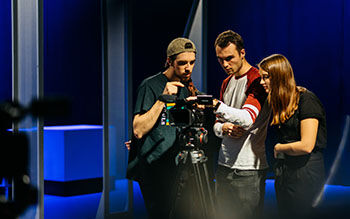
Media and Journalism blog
Take a look at our blog to see the latest news and events around Media and Journalism and get an insight into life as a student at BCU.
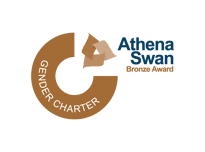
Athena Swan Bronze Award
Our English and Media courses have been awarded the Athena Swan Bronze Award for our commitment to Equality, Diversity and Inclusion (EDI).
Athena SWAN is a quality charter mark framework and accreditation scheme established and managed by the UK Equality Challenge Unit in 2005 that recognises and celebrates good practices in higher education and research institutions towards the advancement of gender equality: representation, progression and success.
Employability
Enhancing employability skills
The aim of our BA (Hons) Media Production course is to prepare you for a career in the fast-paced world of media and broadcasting. Thanks to our outstanding facilities and our reputation for producing work-ready, highly skilled graduates, our students are readily sought after.
As well as your industry-specific skills, you will also develop a range of transferable skills, which will boost your employability, while your network of contacts – from work experience/placements, masterclasses and guest lectures – will be invaluable when you begin to look for employment after graduating.
Placements
You’ll undertake a two-week placement in year one and a three-week placement in year two. Although you’re expected to find the placements yourself, you’ll receive as much support as you need from staff, and you’ll also have opportunity to apply for one of the several placement schemes we operate with the BBC and Sky. We operate an electronic jobs noticeboard, which includes many opportunities, and there are frequent masterclasses from companies that offer placements.
Facilities & Staff
Our Facilities
We are constantly investing in our estate and are currently in the process of spending £260 million on new learning facilities.
Our cutting-edge facilities, including the largest University TV studio, are housed within a purpose-built Media Centre at The Parkside Building, part of our City Centre Campus.
There are four TV studios within the Media Centre, including a large green screen studio. Three of the studios are able to do live multi-camera production and all studios (TV and radio) can be interconnected. It’s taken 22km of wire to make that happen! The Media Centre is fully digital.
Studio A
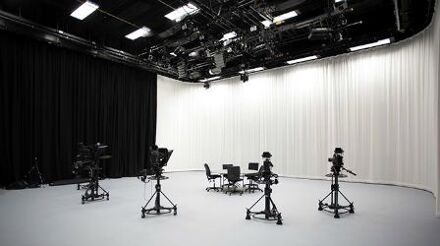
At over 2000sq ft and three stories high, Studio A’s TV floor is the largest of any University studio in the UK. Studio A could easily accommodate shows like ‘Deal or no Deal’, ‘Blue Peter’, ‘The One Show’, ‘Watchdog’ and ‘Newsnight’ to name but a few.
Studio A’s Gallery Suite #1

Studio A’s Gallery Suite #1 (TV) is where production, lighting, camera control, graphics and Autocue are controlled. Sony Broadcast have supported us in the development of the Media Centre, meaning we have professional standard Sony monitors and three of their new full-HD digital vision mixing desks– some of the first examples in the UK.
Studio A’s Gallery Suite #2
Studio A’s Gallery Suite #2 (TV) is an audio gallery where the sound for the studios and the communication for interconnection are controlled. This gallery is also professional standard thanks to Studer audio and a multi-layered ProTools desk. The desk allows for the three audio galleries to be used as independent sound studios or dubbing theatres. Each desk can control up to 120 sound sources in six banks of 20 channels. The desk alone cost £50,000.
Studio B (TV)

Studio B is a green screen studio for recording material that will then have CGI (computer-generated imagery) added to form the final image.
Like Studio A, Studio B is three storeys high. The height allows the heat from the lights to be removed so that the studio floor remains at a reasonable working temperature. All the excess heat generated in the Media Centre will be recycled into hot water for the Parkside Building.
Studio C’s Studio Floor (TV)
Studio C is 1900sq ft, and has a separate production and sound gallery on the same floor. Like all the studios, it is built as a box within a box (to enhance the acoustics for sound recording) and the lighting has been designed so that staff and students will not have to work at height to change the lighting design, this is done through the use of lights and bars which are moved across the grid by poles.
Post-Production Suites (TV)
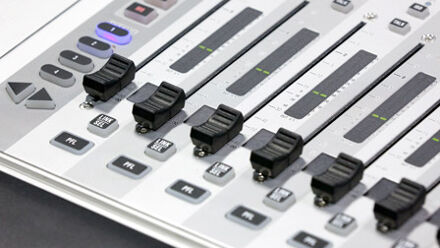
The Media Centre has four fully professional standard edit suites, based on the industry-standard Avid editing system, which is used in almost all films and the majority of UK television. Though all of the suites can edit, two of the suites are specialised for Audio Finishing and Colour Grading. The Media Centre has a further 20 Avid machines in the post-production teaching suite on Level 0.
Dubbing Suites (TV)
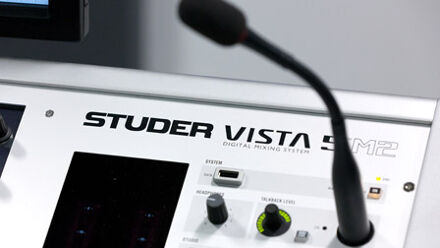
The Media Centre has full professional standard dubbing suites. Based on a multi-layered ProTools desk, the suites can dub both film and TV projects with up to 120 simultaneous sound sources. There is an ADR (Additional Dialogue Recording) booth and the ability to record Foley (additional live sound, like footsteps). If additional Foley activity is required, for example to cover a crowd scene, then one of the radio studios or TV studio floors can be used and the sound delivered to a dubbing suite through the technical integration system.
Our staff
Ellie Tomsett
Senior Lecturer
Dr Ellie Tomsett is a Senior Lecturer in media and film. Before teaching in Higher Education, Ellie worked in the UK film education sector. During this time she delivered training to teachers, youth workers and professional filmmakers across the country and organised filmmaking and theory activities for large organisations such as The BFI, The...
More about EllieRobin Kay
Lecturer
Robin is a Lecturer in Media and Communication with a New Media specialism. He has a background within the music industry having worked for several notable record labels and industry organisations including: Ministry of Sound Recordings, Defected Records, Sanctuary Records and PRS. He has extensive experience within education and teaches creative...
More about RobinDave Harte
Head of the College of English and Media (interim)
Dave Harte is Associate Professor in Journalism and Media Studies. His research is focused on local and community journalism, and he has published widely on these topics.
More about DaveHilary Weston Jones
Lecturer in Professional and Academic Development
Hilary specialises in embedding employability within modules across all years and supporting students with securing work placements. Having spent 24 years working as a Television Production Manager (BBC and Independents), Hilary teaches and mentors students within this area.
More about Hilary

